OA World Services Policy:
Sharing OA-Copyright Material Electronically


What is a Specific Focus Meeting? Within the OA Fellowship, there are members who have discovered they are more comfortable meeting with other members who share similar attributes. All OA members are welcome at these meetings. For a full list, see the Find a Meeting page.
Here’s how you can locate them. Visit the OA website and click on Fiind a Meeting for listings of meetings worldwide. To find an online meeting, for instance, click on that category. Select your time zone and the day. Before you click on the red button, Find a meeting, click on Additional search options toward the bottom of the page to select a category. You’ll see various options you can select: Time of day, Specific Topic, Language, All Meetings (with or without visitors), and Specific Focus. The search criteria for specific focus below was current as of September 2023.
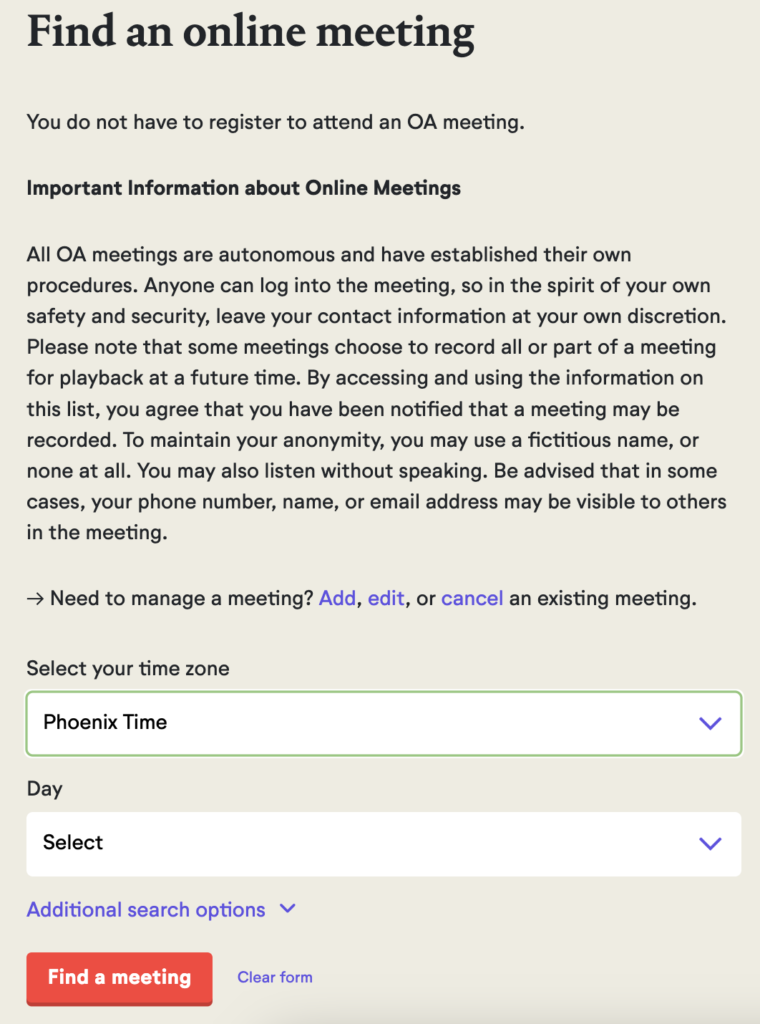
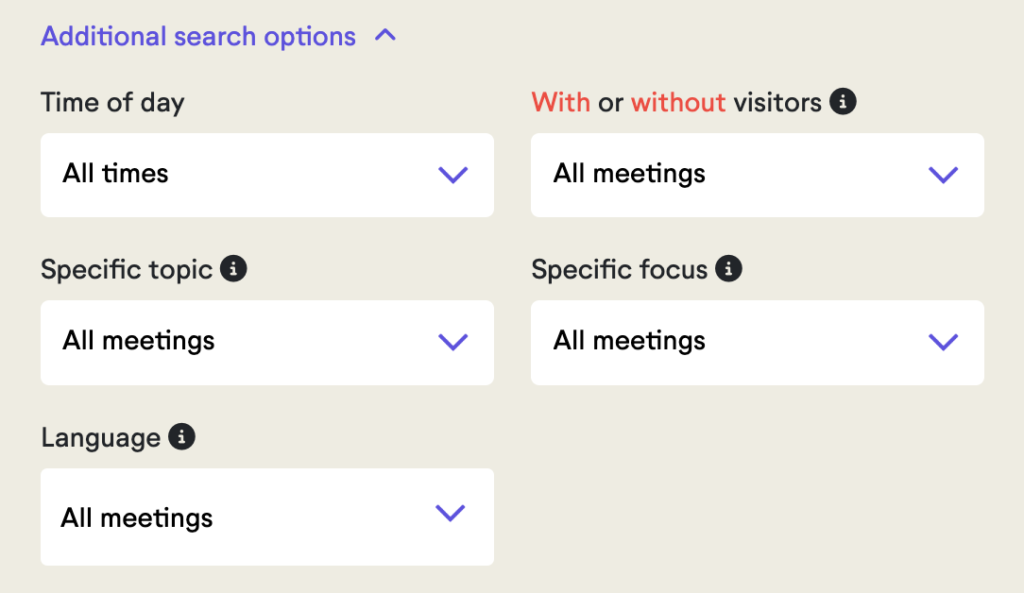
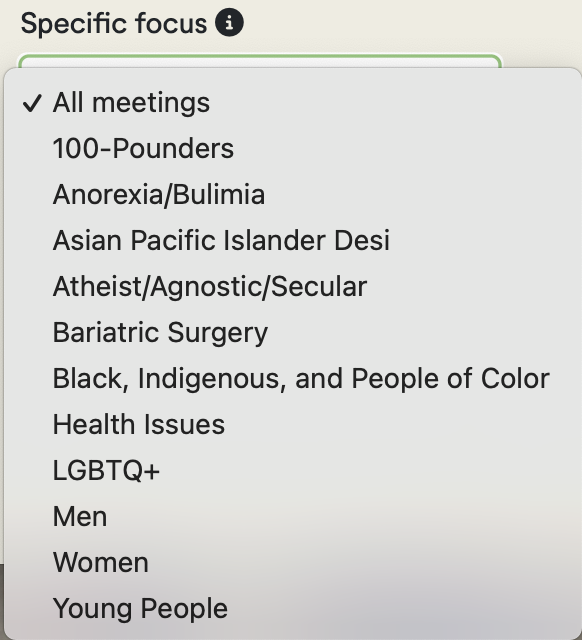
OA’s Unity with Diversity Policy
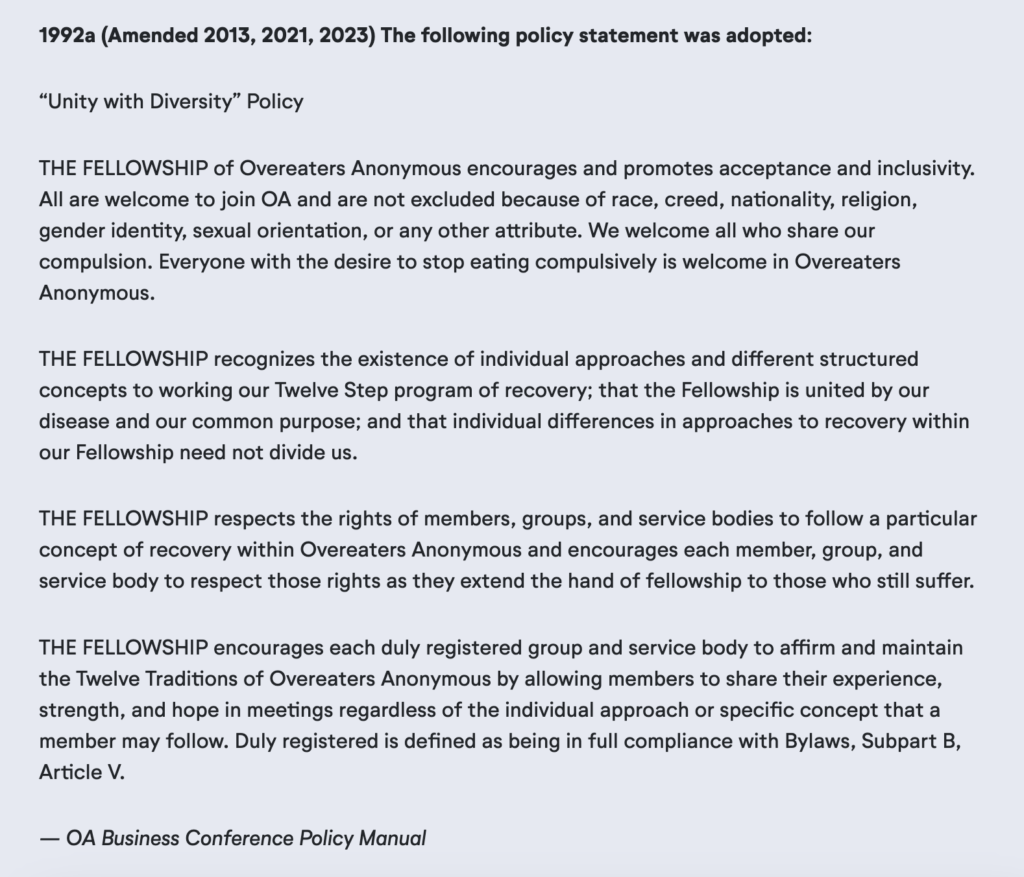
OA’s Unity with Diversity Checklist. The OA checklist provides a means for OA groups and service bodies to make certain that they are upholding the OA Unity with Diversity Policy statement. Checkpoint 9 provides a list of resources reproduced below for quick access.
List of Resources Highlighting Inclusion and Diversity
A Common Solution: Diversity and Recovery (pamphlet)
Black OA Members Share Their Experience, Strength, and Hope (pamphlet)
Focus on Anorexia and Bulimia Packet
Many Symptoms, One Solution [flyer]
OA Members Come in All Sizes (pamphlet)
To the Young Person (downloadable PDF)
To the Man Who Wants to Stop Compulsive Overeating, Welcome (pamphlet)
Meetings provide a vital connection for our members and visitors. We are a community of people who through shared experience, strength, and hope are recovering from unhealthy relationships with food and body image.
Overeaters Anonymous offers over 6,400 face-to-face and virtual meetings worldwide, and in languages other than English. Find a meeting that will work for you and your schedule. Meetings help us learn about the Tools and Steps, and also provide fellowship, which is critical to our recovery. We have discovered we need each other to get well. To see our current meetings in Southern Arizona, click on THIS LINK.
To find a meeting – whether it be Face-to-Face, Online, Telephone, or, Non-Real-Time – visit oa.org to learn more. The types of meetings listed below are linked to the Overeaters Anonymous website for your convenience.
Face-to-Face. To find these meetings, provide location details.
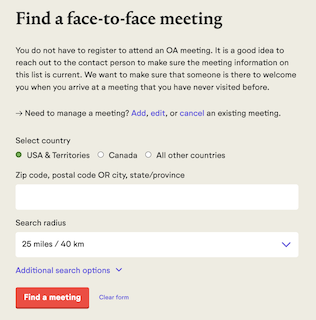
Phone. Be sure to read the information below.
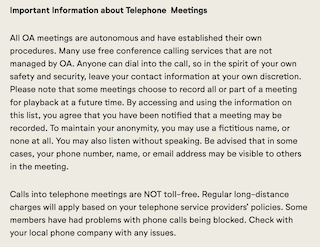
“WHO YOU SEE HERE, WHAT YOU HEAR HERE,
WHEN YOU LEAVE HERE, LET IT STAY HERE.”

If you are part of an underrepresented group in OA, you may want to try a Specific Focus Meeting for a variety of underrepresented groups. All OA meetings are open to ALL members; however, Specific Focus Meetings can help some members feel more at home. Click HERE to learn more.
Click HERE to read the letter from the World Service Organization (WSO) Board of Trustees (2022) about sharing copyrighted material electronically.
Meetings • New to OA • Publications • Recovery • Service • The OA Program
In working Overeaters Anonymous’ The OA 12 Twelve-Step program of recovery from compulsive overeating, we have found a number of tools to assist us. OA has defined nine tools to help members achieve and maintain Abstinence. You are not alone!
The 9 tools of the OA program are: A Plan of Eating, Sponsorship, Meetings, Telephone, Writing, Literature, Action Plan, Anonymity and Service, which are detailed below.
As a tool, a plan of eating helps us to abstain from eating compulsively.
Having a personal plan of eating guides us in our dietary decisions, as well as defines what, when, how, where and why we eat. It is our experience that sharing this plan with a sponsor or another OA member is important.
There are no specific requirements for a plan of eating; OA does not endorse or recommend any specific plan of eating, nor does it exclude the personal use of one. (See the pamphlets Dignity of Choice and A Plan of Eating for more information.) For specific dietary or nutritional guidance, OA suggests consulting a qualified health care professional, such as a physician or dietician. Each of us develops a personal plan of eating based on an honest appraisal of his or her own past experience; we also have come to identify our current individual needs, as well as those things which we should avoid.
Although individual plans of eating are as varied as our members, most OA members agree that some plan “no matter how flexible or structured”; is necessary.
This tool helps us deal with the physical aspects of our disease and helps us achieve physical recovery. From this vantage point, we can more effectively follow OA’s Twelve-Step program of recovery and move beyond the food to a happier, healthier and more spiritual living experience.
Sponsors are OA members who are living the Twelve Steps and Twelve Traditions to the best of their ability.
Sponsors should also have a sponsor. Sponsors help others by sharing their experience, strength and hope around living without eating compulsively, working the 12 Steps of OA , and being committed to abstinence.
We ask a sponsor to help us through our program of recovery on all three levels: physical, emotional and spiritual. By working with other members of OA and sharing their experience, strength and hope, sponsors continually renew and reaffirm their own recovery. Sponsors share their program up to the level of their own experience.
Ours is a program of attraction: find a sponsor who has what you want, and ask that person how he or she is achieving it. A member may work with more than one sponsor and may change sponsors at will.
Meetings are gatherings of two or more compulsive overeaters who come together to share their personal experience, and the strength and hope OA has given them.
Though there are many types of meetings, fellowship with other compulsive overeaters is the basis of them all. Meetings give us an opportunity to identify and confirm our common problem and to share the gifts we receive through this program.
The telephone helps us share one-to-one and avoid the isolation which is so common among us.
Many members call other OA members and their own sponsors daily. As a part of the surrender process, it is a tool with which we learn to reach out, ask for help and extend help to others. The telephone also provides an immediate outlet for those hard-to-handle highs and lows we may experience.
In addition to writing in our step work, most of us have found writing to be an indispensable tool in our recovery.
Further, putting our thoughts and feelings down on paper, or describing a troubling incident, helps us to better understand our actions and reactions in a way that is often not revealed to us by simply thinking or talking about them. It is also helpful to share what we’ve written with our sponsor or another trusted, close-mouthed friend. In the past, compulsive eating was our most common reaction to life. When we put our difficulties down on paper, it becomes easier to see situations more clearly and perhaps better discern any necessary action.
We study and read OA-approved pamphlets; OA-approved books, such as Overeaters Anonymous, Second Edition, The Twelve Steps and Twelve Traditions of Overeaters Anonymous and For Today.
We also study the book Alcoholics Anonymous, referred to as the “Big Book,” to understand and reinforce our program. Many OA members find that when read daily, the literature further reinforces how to live the Twelve Steps. Our OA literature and the AA “Big Book” are ever-available tools which provide insight into our problem of eating compulsively, strength to deal with it, and the very real hope that there is a solution for us.
Literature can be purchased through OA World Services, some OA meetings.
An action plan is the process of identifying and implementing attainable actions, both daily and long-term, that are necessary to support our individual abstinence and emotional, spiritual and physical recovery.
While the plan is ours, tailored to our own recovery process, most of us find it important to work with a sponsor, fellow OA member and/or appropriate professional to help us create it. This tool, like our plan of eating, may vary widely among members and may need to be adjusted as we progress in our recovery.
For example, a newcomer’s action plan might focus on planning, shopping for and preparing food. Some members may need a regular fitness routine to improve strength and health, while others may need to set exercise limits in order to attain more balance. Some of us may need an action plan that includes time for meditation and relaxation or provides strategies for balancing work, personal interactions with family and friends, and our program. Others may need help to organize their homes; deal with their finances; and address medical, dental or mental health issues.
Along with working the Steps on a daily basis, an action plan may incorporate use of the other OA tools to bring structure, balance and manageability into our lives. As we use this tool, we find that we develop a feeling of serenity and continue to grow emotionally and spiritually while we make measurable progress one day at a time.
Anonymity, referred to in Traditions Eleven and Twelve, is a tool that guarantees that we will place principles before personalities.
The protection anonymity provides offers each of us freedom of expression and safeguards us from gossip. Anonymity assures us that only we, as individual OA members, have the right to make our membership known within our community. Anonymity at the level of press, radio, films and television means that we never allow our faces or last names to be used once we identify ourselves as OA members. This protects both the individual and the Fellowship.
Within the Fellowship, anonymity means that whatever we share with another OA member will be held in respect and confidence. What we hear at meetings should remain there. However, anonymity must not be used to limit our effectiveness within the Fellowship. It is not a break of anonymity to use our full names within our group or OA service bodies. Also, it is not a break of anonymity to enlist Twelfth-Step help for group members in trouble, provided we refrain from discussing specific personal information.
Another aspect of anonymity is that we are all equal in the Fellowship, whether we are newcomers or seasoned long-timers. And our outside status makes no difference in OA; we have no stars or VIPs. We come together simply as compulsive overeaters.
Carrying the message to the compulsive overeater who still suffers is the basic purpose of our Fellowship; therefore, it is the most fundamental form of service.
Any form of service, no matter how small, which helps reach a fellow sufferer adds to the quality of our own recovery. Getting to meetings, putting away chairs, putting out literature, talking to newcomers, doing whatever needs to be done in a group or for OA as a whole are ways in which we give back what we have so generously been given. We are encouraged to do what we can when we can. “A life of sane and happy usefulness” is what we are promised as the result of working the Twelve Steps. Service helps to fulfill that promise.
As OA’s responsibility pledge states: “Always to extend the hand and heart of OA to all who share my compulsion; for this I am responsible.”